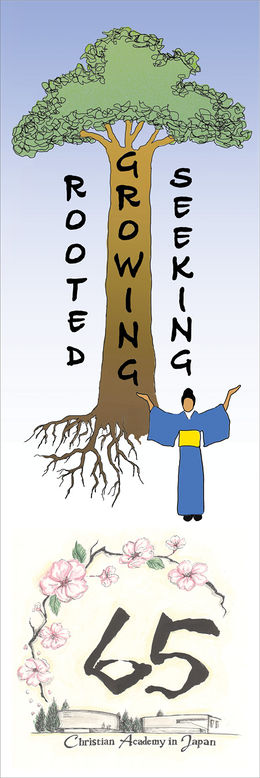Difference between revisions of "At CAJ (Headmaster blog)"
Brvanderhaak (talk | contribs) (Created page with '<sophie article="At CAJ (Headmaster blog)"/>') |
|||
| Line 1: | Line 1: | ||
| − | <sophie article="At CAJ (Headmaster blog)"/> | + | <sophie article="At CAJ (Headmaster blog) Our Big Tent - October 2012"/> |
Revision as of 09:07, 19 November 2012
Our Big Tent | October 2012[edit]
Your servant in Him,
Brian Vander Haak
Headmaster
Christian Academy in Japan
- In response to the discussion about English use and translation we have clarified our Communicating With CAJ in English policy as well as continued exploration of English Use On Campus. Both of these policies will be further examined as part of our evolving communication strategy.
日本語[edit]
CAJは、クリスチャンの考え方や行動が広範囲にわたって表わされているところです。私達は、様々な神学的立場をもつクリスチャンの家族の方々を幅広く快く受け入れていますし、クリスチャンではない家族の方々も本校のプラグラムと交わりの中へ暖かく歓迎しています。このことを、しばしば、『“大きなテント”入学受け入れ方針』と、呼んでいます。
多分、大きなテントの中で同時にいろいろなことを行っている、巡回サーカスの様子からこの言葉がついたのでしょう。
このような包括性は、いろいろなディスカッション、問いかけ、発見に引き込むような、刺激的な場所をつくるでしょう。 お互いが他者の考えをすぐに否定するのではなく、むしろ尊重し合うなかで、個々の考えを養護する方法を知っている限り、それはとても、刺激的な場所であるでしょう。尊重しつつ、この特別な場所で起こりうるチャレンジをともに受け入れることは、 私、学校長や、学校役員、教職員達だけの仕事ではなく、ここに関わるすべての人たちがするべきことであり、ともにその機会を楽しむことなのです。
現在、私は、大学院のコースで指導論について学んでいます。先週は、クリスチャンスクールでありつつ、クリスチャンではない家庭から子弟を受け入れている学校がもつチャレンジについて討論しました。同じコースのクラスメートが、何故このことがチャレンジなのかと思ったようで、『あなたの学校にとって、なぜ、そのことが、問題なのでしょうか? ただ、通常のスクールのプログラムを教えつつ、宗教の時間を付け加えているだけではないのですか? わたしもキリスト教系の大学に行きましたが、チャペルの時間以外は何も他の大学と違うとは思いませんでした。』と、書いてきました。まず彼女に対して、CAJのスタイルはかなり違うものであることを説明しなければなりませんでした。また、当校で作成した [『 キリスト教に焦点をあてた欧米式教育への理解』] いう小冊子の内容を分かち合いました。
『チャレンジ』という語と、『問題』という語のもつ意味の違いについても話し合いました。 私達は、クリスチャンでない家族の方々を受け入れていることに対して、それを『問題』と考えたことはありません。『問題』という言葉の意味合いは、何かを止めるように試みたり、直そうと求めることです。わたしたちは、そう考えているのではなく、この学校のプログラムにクリスチャンでない家族が受け入れられることは、すばらしい祝福であり、歓迎することであって、価値のあるチャレンジとして受け入れているのです。
クリスチャンの考えに焦点をおくという我々のプログラムに対して、妥協できない状況があるときには、チャレンジが生じます。
私達は、単にチャペルタイムと、宗教のクラスを提供するだけで良いとは思っていません。 教職員がすべてのことにおいてクリスチャンの考えを浸透させていくことで、生徒たちが自分自身の世界観を持っていくときに聖書の主義も明確に表現できるようになることを期待しているのです。
各々の学生達にクリスチャンになることを強制していません。また、クリスチャンのふりをするような偽の信仰をもつことも願っていません。 私達は、すべての学生が同じような世界観を明瞭に表現できることを期待しませんが、と同時に、彼らがクリスチャンの展望を理解できるようになることを願っています。クリスチャンではない学生達がこの教育経験(批判的思考)に基づいて得るものは、質の高い質問や応用ができるようになることなのです。すべてのことを繊細に、上手にバランスをとっていくことはチャレンジです。違う考えの間に注意深く細い線を引くようなことなのです。このようなアプローチをする上で、違う考えに対する不寛容な態度は許されません。生徒達や家族の方からクリスチャンでないということで偏見的扱いをうけたという意見や報告を受けた場合は、早急に学校として対応していきます。もちろんクリスチャンでないご家族や生徒達の中には、このような環境を受け止めるために葛藤する方々もいるでしょう。しかし、多くの人たちが本校のプログラムを通して、成長しています。
高校最終学年が行う卒業プロジェクトは、 洗練された方法で、聖書の考えの適用も必要とされるのですが、優秀な結果を出したいくつもの発表は、クリスチャンではない生徒達によって成されています。
私自身が子供の頃通っていたクリスチャンスクールは、クリスチャンの家族の子弟だけが入学でき、しかも、ほとんどの生徒達が同じような神学的立場や、同じ教派、同じキリスト教の伝統をもつ家庭からきていました。そのような“小さなテント”の中で育った私にとって、このように多様性に富んだCAJは、非常に働きがいのある楽しい場所なのです。わたしたち、(みなさんと、私)がこの特別な場所でともにその一員であることを心から嬉しくおもっています。
主のしもべ
クリスチャン アカデミー イン ジャパン
学校長 ブライアン バンダーハック
英語の使用と翻訳に関するディスカッションにおいて、CAJでの英語のコミュニケーションポリシーCommunicating With CAJ in Englishを明確にすると同時に、CAJキャンパス内での英語の使用ポリシーEnglish Use On Campusについて引き続き吟味します。我々のコミュニケーション向上のためにも、このふたつのポリシーを検討していきます。





